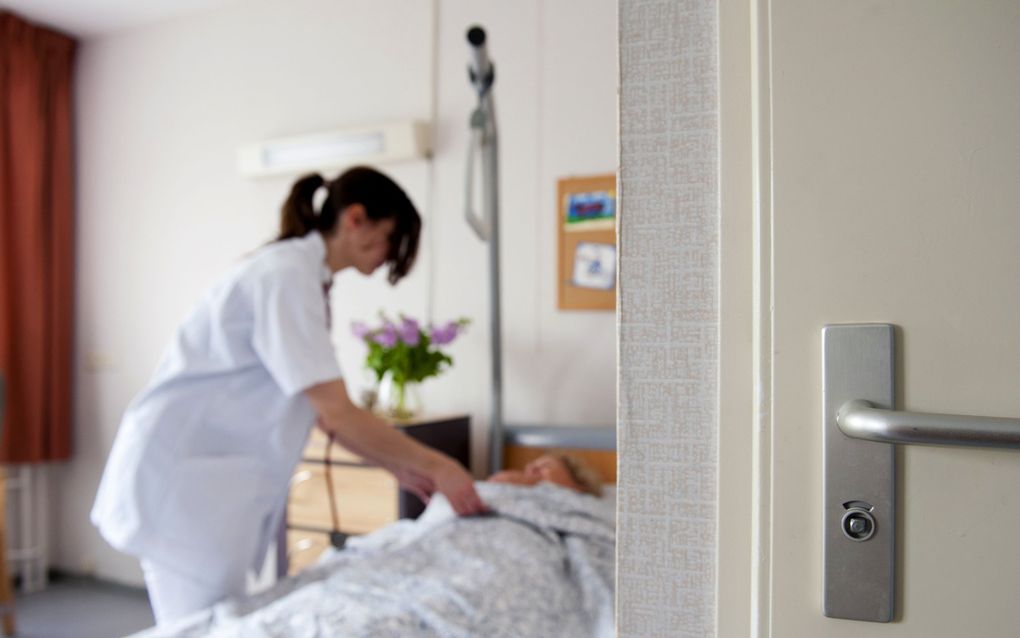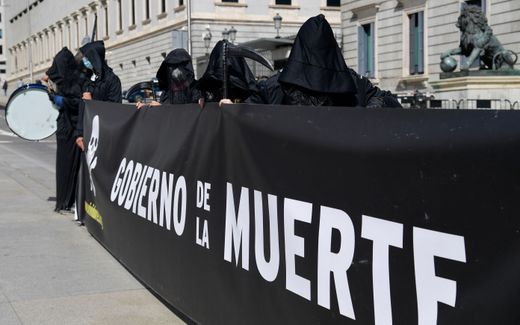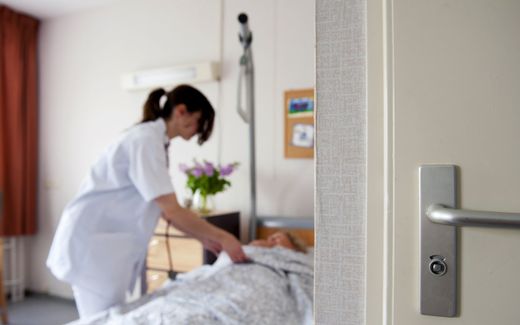Seven countries in Europe where end-of-life issues are at the top

Photo ANP, Roos Koole
European Union
In at least seven European countries, the right to die is moving to the top of the political agenda. An overview.
The Netherlands: court case about assisted suicide death
The Dutch Janine de Graaf-Klunder (60) went to court on Monday. Together with 29 other plaintiffs, she wants to lift the ban on assisted suicide. One of the plaintiffs is the Last Will Society (Coöperatie Laatste Wil, CLW). This organisation advocates self-determination around the deathbed.
The CLW refers to the European Convention on Human Rights, that says that “everyone has the right to respect for his private life” and that “no interference by any public authority is allowed in the exercise of this right except to the extent provided for by law and necessary in a democratic society”. This writes Dutch public broadcaster NOS.
At the moment, euthanasia is only possible in case of “unbearable and hopeless suffering”. Assisted suicide, the act of actively helping people kill themselves, is illegal in the Netherlands, except when a doctor is doing it.
The father of Janine de Graaf-Klunder suffered from dementia when he ended up in the hospital. “If I cannot take care of myself anymore, I do not want to live anymore”, he had said to his children. However, when the man could not take care of himself, euthanasia was no longer an option. “Because of his condition, he was not allowed to decide for himself”, Janine told Dutch daily NRC.
Her experiences have shaped her conception of death: she wants people to be able to make their own end-of-life decisions. “But I feel hampered in this by the state.”
Protected from themselves
In the court, the Dutch State argued that the current legislation provides a balance between the duty to protect human life, especially of the vulnerable and incapacitated, and “personal autonomy” in hopeless and unbearable suffering. Interference may therefore be justified given that protection. “The legislator cannot please everyone and has to make choices. That these are painful in specific cases does not take away from the fact that the law must be enforced,” said one of the State’s counsels. “People also need to be protected from themselves.”
The court in The Hague will rule by December 14th. However, the Netherlands is not the only European country struggling with questions about euthanasia and assisted suicide.
Italy: ambiguous end of life regulations
In Italy, euthanasia and assisted suicide are officially forbidden. However, a 2019 decision by the country’s Constitutional Court found that assisted suicide was permissible when patients could make decisions and in overwhelming pain, legalising it in practice. This writes Politico. In February 2022, as CNE reported earlier, the Constitutional Court denied a request to hold a referendum on the decriminalisation of euthanasia after a petition signed by over a million people asked for it.

Italy’s ambiguous regulations around the end of life make it easy picking for activists. In June, a 44-year-old man who was paralysed in a car accident 12 years earlier died in Italy’s first case of medically assisted suicide. In August, Italian activist Marco Cappato accompanied a patient with a death wish to Switzerland so that she could access assisted suicide. Cappato reported himself to Italian authorities afterwards, making it once again a media spectacle.
In Switzerland, supplying the means for committing suicide is legal as long as the action directly causes death is performed by the one wishing to die. Foreigners have widely used Swiss euthanasia organisations.
France: national debate about legalising end-of-life
In September, French president Emmanuel Macron announced a national debate to broaden end-of-life options that will include exploring the possibility of legalising assisted suicide. Under the current 2016 law, French doctors can keep terminally ill patients sedated until death but assisted suicide is not legal.
Macron said in a written statement that a body composed of citizens will work on the issue in the coming months in coordination with health care workers, while local debates are to be organised in French regions. The government will, in parallel, hold discussions with lawmakers from all political parties in order to find the broadest consensus. This reports France24.
In 2020, the French Alain Cocq, who suffered from a rare, incurable disease, stopped eating and drinking. He wanted to live stream his death to spark the euthanasia debate in France. After intolerable pain forced him to resume eating and taking medicines, Cocq died in Switzerland in 2021. An NGO had helped him to travel to Switzerland, where he was assisted in his suicide.
Portugal: president is vetoing
In Portugal, where euthanasia and assisted suicide are illegal, the subject causes political mayhem. For a third time, a bill permitting euthanasia and assisted suicide will be put into a vote in the near future.

Two times earlier, the law passed Parliament with a majority. However, President Marcelo Rebelo de Sousa, a Roman Catholic, vetoed the bill twice and rejected it after the Constitutional Court said the law was imprecise in identifying the circumstances under which the procedures can occur and thus declaring it unconstitutional.
On June 9th, 2022, the Portuguese lawmakers made a third attempt, approving it in Parliament. The four approved bills will now be blended in a parliamentary committee and then approved in a final voting.
Spain: first steps with euthanasia
Active euthanasia and assisted suicide are legal in Spain. On March 18th, 2021, Spain’s parliament voted in favour of the bill, thus making it law. It was sanctioned by the King on March 24th, 2021, and came into force on June 25th, 2021.
The law says adults with conditions that cause “unbearable suffering” can choose to end their lives through physician-assisted suicide. It makes no exceptions for people in the middle of legal proceedings.
The lack of exemptions became a problem for Spanish authorities this summer. In August, they came under scrutiny after it permitted the euthenasia of a man who faces trial for shooting and wounding three people at his former workplace. The decision led to criticism from victims who said he should not be helped to die before going to court. This reports the Washington Post.
“I am paraplegic. I have 45 stitches on my hand. I can’t move my left arm well. I have screws, and I can’t feel my chest,” Sabau said in a statement from the prison hospital that was released to local media outlets, according to the Spanish daily newspaper El Pais.
Austria: assisted suicide legalised
In Austria, the ban on assisted suicide was lifted on January 1st. The ban on euthanasia, meanwhile, could be overturned in the near future, writes Die Tagespost. The lifting of the ban on assisted suicide came after the Constitutional Court ruled that a ban would violate the right to self-determination. A new law was therefore needed to regulate the practice.
The Catholic Church, dominant in Austria, strongly opposed the move. The chairman of the Bishops Conference called the legal approval of assisted suicide "the most serious event of the past year", writes Euronews.
Belgium: more euthanasia for psychic patients
Belgium is increasingly offering euthanasia as a solution to psychic problems, reports the pro-life One of Us Federation. In May, a 23-year-old Belgian woman, a survivor of the 2016 Brussels airport attack, was legally euthanised. Her relatives confirmed this earlier this week. Shanti de Corte suffered from serious mental problems after the terror attack.
Belgium was, after the Netherlands, the first country to legalise euthanasia. It did so on May 28th, 2002.
Last week, the European Human Rights court ruled that the Western European country had violated the right to life by euthanising a woman suffering from "incurable depression". The woman approached several medical experts for a euthanasia request, to which the experts agreed. However, since they were also part of the euthanasia association, the Court ruled that Belgium failed to ensure the independence of the control system that has to prevent abuse of the option of euthanasia.
According to ADF International, who represented the son of the euthanised woman, the ruling clarifies that "the so-called safeguards failed because intentional killing can never be safe."
Related Articles






